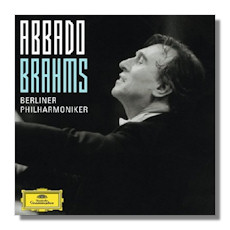
The Internet's Premier Classical Music Source
Related Links
- Brahms Reviews
- Latest Reviews
- More Reviews
-
By Composer
-
Collections
DVD & Blu-ray
Books
Concert Reviews
Articles/Interviews
Software
Audio
Search Amazon
Recommended Links
Site News
 CD Review
CD Review
Johannes Brahms

- Symphony #1
- Symphony #2
- Symphony #3
- Symphony #4
- Serenade #1 *
- Serenade #2
- Variations on a Theme by Haydn
- Academic Festival Overture
- Tragic Overture
- Schicksalslied **
- Alto Rhapsody **
- Gesang der Parzen ***
- Nänie ***
** Marjana Lipovšek, contralto
** Ernst Senff Chor
*** Berlin Radio Choir
* Mahler Chamber Orchestra/Claudio Abbado
Berlin Philharmonic Orchestra/Claudio Abbado
Deutsche Grammophon 4793192 5CDs
Let me tell you right off the bat what this is and is not. It is a fabulous set, a true tribute to one of the great conductors of our age, who led the Berlin Philharmonic through times of great struggle and change. Ignore the box, though; these are not Abbado's complete Brahms' recordings. Not on Universal, not on DG, not with Berlin, and not even of these pieces in Berlin. Are these largely accepted as the preferred versions? Sure. But if you're going to advertise something, you might as well do it right. Of the omissions, Gil Shaham's magnificent Violin Concerto is the most serious, but there's no denying that what is here is great, and one of the greatest Brahms' symphony cycles of all time.
Disc one begins with what was originally left off the single disc releases of the cycle; namely an Academic Festival Overture that features some fabulous playing. Some critics even believed that even if one owned the four single albums that originally comprised the set, this filler was worth investing in the subsequent box sets. For the Academic Festival Overture? No way. Still, this is world-class. Gesang der Parzen is an interesting, large-scale choral work that – like all of the choral pieces save the Alto Rhapsody – may or may not be a bonus for you. I will not speak on any of them at length, but the singing is superb. Finally, we reach the First Symphony. It carries tremendous weight, and the orchestral contributions are astounding. Not only are the Berlin strings typically fabulous, Abbado really does outdo Karajan with his willingness to balance the sections and allow an exceptional clarity throughout. It isn't the most incisive Brahms – for that, look to George Szell or his former student James Levine – but it is some of the most beautiful. For all the talk about approaches, editions, and ensemble size, Brahms really does sound best when you play what the man wrote and leave it alone.
The rest of the set is more of the same. Disc two features a gloriously played and sung Alto Rhapsody and a wonderful Symphony #2. Karajan always did well by this latter work, and so did Abbado. This is not his earlier Berlin recording, seen last on Australian Eloquence, but is his later (and generally better) account. Unlike Karajan, Abbado is again able to manage orchestral balances with genuine care. Only the fourth movement coda seems slightly underpowered, but in all respects this is world-class music making.
Brahms' Symphony #3 is the shortest of the four symphonies, and forms the centerpiece of disc three. It's a masterful account. This is easily the most difficult of the four to do well, so it's a credit to the conductor that almost nothing goes wrong. There are numerous personal touches that really do make all the difference; note the effortless ebb and flow of the first movement, or the unusually cogent finale. Funnily enough, other conductors who had variable success in "easier" repertoire (Solti, Levine) also did excellent work with this symphony. But whether it was the added challenge, or the need for greater concentration, Abbado gives us one of the great readings of the piece from Berlin. Conversely, as impressed as I am with the orchestral work, I find the coupled Tragic Overture to be lacking in the razor-sharpness I feel the score requires, and for that reason prefer the likes of Bruno Walter, now on Sony. Again, the choral work goes fine.
On disc four, the Haydn Variations are excellent, less episodic than usual and wonderfully played. How many of these DG needs is a valid question – as Bohm's are also splendid – but I'm happy to have it all the same. Following a final large-scale choral work (good, but hardly essential), the Symphony #4 ends the cycle in a satisfying fashion. As before, the entire orchestra is exceptional, and Abbado's pacing and interpretive choices seem ideal. Again, DG/Universal has some fine Fourths lying around, but as a whole, the concept of this cycle – including the choral works to go with the more common lighter fare – is wholly successful.
The final disc holds the two serenades. The First dates from a concert with the Mahler Chamber Orchestra near the end of Abbado's career, the Second comes from the very start of the conductor's professional association with the Berlin Philharmonic. While this disc is supposed to give an overview of the conductor's career, not only does it make a mess of the "complete Berlin recordings" concept, but it also arguably chooses the wrong pieces to do it with. If you are going to illustrate a career evolution, do it with more substantial fare. But that's simply carping. Originally, the First was a download only, so it's nice to have here. The Second has been harder to find, and does succeed in showing that even in 1967, Abbado did very good Brahms. Considering that this disc is a bonus added to what used to be a full-priced set, this sturdy and attractive little box is a real find for those who want to hear the conductor at his best in Berlin. Now, if it had only been complete!
Copyright © 2014, Brian Wigman


















